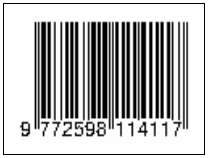Effect of Zeba (Super absorbent polymer) to combat the impacts of increased temperature and irrigation interval on growth and yield attributes of Chilli (Capsicum annum)
Abstract
Full Text:
PDFReferences
Cruz, R., Harasawa, H., Lal, M., Wu, S., Anokhin, Y., Punsalmaa, B., Honda, Y., & Jafari, M., Li, C., and Ninh, N. (2007). Asia. Climate change 2007: Impacts, adaptation and vulnerability. Contribution of Working Group II to the Fourth Assessment Report of the Intergovernmental Panel on Climate Change. 469506.
De Silva, C. S., Weatherhead, E. K., Knox, J. W., and Rodriguez-Diaz, J. A. (2007). Predicting the impacts of climate change. A case study of paddy irrigation water requirements in Sri Lanka. Agricultural water management, 93(1-2), 19-29.
Hatfield, J. L., and Prueger, J. H. (2015). Temperature extremes: Effect on plant growth and development. Weather and climate extremes, 10, 4-10.
Rodríguez-Salazar, J., Suárez, R., Caballero-Mellado, J., and Iturriaga, G. (2009). Trehalose accumulation in Azospirillum brasilense improves drought tolerance and biomass in maize plants. FEMS Microbiology Letters, 296(1), 52-59.
Sadras, V. O., Villalobos, F. J., Orgaz, F., and Fereres, E. (2016). Effects of water stress on crop production. Principles of agronomy for sustainable agriculture (pp. 189-204). Springer, Cham.
Saha, S., Moorthi, S., Pan, H. L., Wu, X., Wang, J., Nadiga, S., and Goldberg, M. (2010). The NCEP climate forecast system reanalysis. Bulletin of the American Meteorological Society, 91(8), 1015-1058.
Gunawardena, M. D. M., and De Silva, C. S. (2014). Identifying the impact of temperature and water stress on growth and yield parameters of chilli (Capsicum annuum L.).
Alvino, A., Centritto, M., and Lorenzi, F. D. (1994). Photosynthesis response of sunlit and shade pepper (Capsicum annuum) leaves at different positions in the canopy under two water regimes. Functional Plant Biology, 21(3), 377-391.
Sayyari, M., and Ghanbari, F. (2012): Effects of super absorbent polymer A200 on the growth,yield and some physiological responses in sweet pepper (Capsicum annuum L.) undervarious ırrigation regimes. International Journal of Agricultural and Food Research 1(1):1-11
Snedecor, G. W., and Cochran, W. G. (1989). Statistical methods, 8thEdn. Ames: Iowa State Univ. Press Iowa, 54, 71-82.
Haji-hasani-asl,N., Moradi,A.A, Shiranirad, A.H., Hosseini, N., &Rasaeifar, M. (2010). Effect of drought stress on forage yield and agronomical characters of millet, sorghum and corn in delay cropping. Journal Crop Production and Research 2 (1): 63-74.
El-Hady, O. A., Tayel, M. Y., & Lotfy, A. A. (1981, March). Super Gel as a soil conditioner II-Its effect on plant growth, enzymes activity, water use efficiency and nutrient uptake. In III International Symposium on Water supply and Irrigation in the open and under Protected Cultivation 119 (pp. 257-266).
Refbacks
- There are currently no refbacks.








